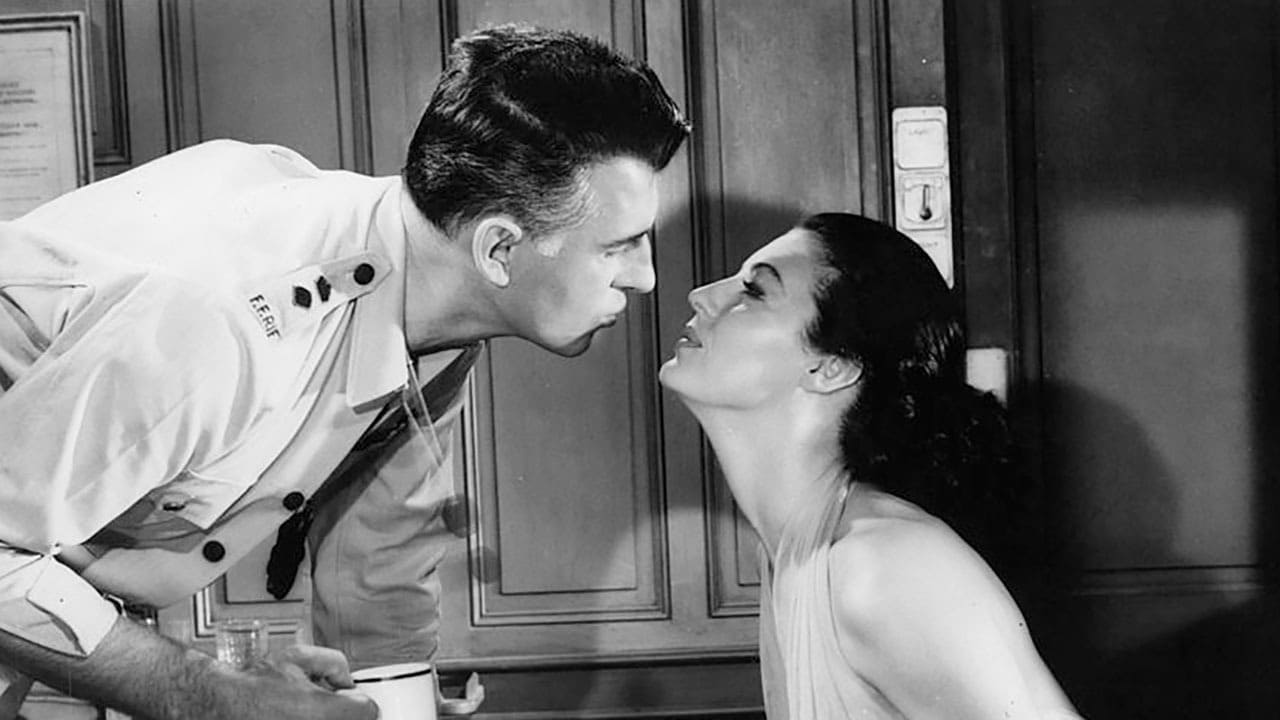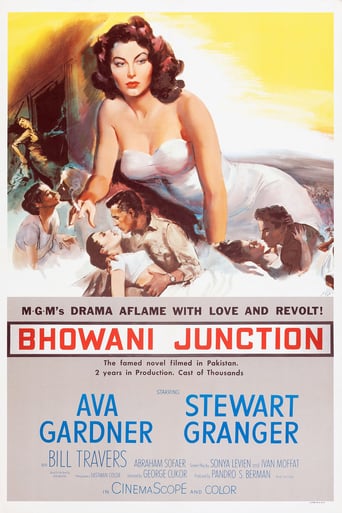Diagonaldi
Very well executed
Breakinger
A Brilliant Conflict
Myron Clemons
A film of deceptively outspoken contemporary relevance, this is cinema at its most alert, alarming and alive.
Philippa
All of these films share one commonality, that being a kind of emotional center that humanizes a cast of monsters.
Guy
Plot: An Anglo-Indian woman is forced to assess her identity as Britain withdraws from her Indian colony.The film-makers deserve a lot of blame for the deeply uneven nature of this film. Whilst the Technicolor drama is lurid, the crowd scenes are naturalistic, and some scenes (notably the rape-murder) are stylised. The result is a complete mess, not helped by Ava Gardener's grotesquely melodramatic acting. She always liked a dram, and it shows in her florid complexion. Thankfully, Stewart Granger adds a welcome calm and command when on screen. Also against this film are the white actors painted brown to look like Indians. I have no objections to the practice (English speaking Indian actors weren't easy to find in the 1950s) but in several cases the make-up is so bad that it is distracting. The Indian actors themselves are all very creditable, out- acting some of the 'noise and fury' European actors. What makes this film worth watching is the subject matter and the mature and complex way in which it is dealt with. Far too many films on racism are one-dimensional rants, but this, thanks to its source material in John Master's excellent and authoritative novel, is complex. Rather than simple black and white you have whites against Indians, Anglo-Indians against all, Communists against Congress, Hindu caste against caste, religion against religion. Everyone is implicated, but everyone is a human rather than a viewpoint. So the racist and snobbish Anglo-Indian lover who is obsessed with not letting the sun darken his complexion (still common in India where skin-lightening creams are much prized) also risks his life to save Indian peasants who are the darkest of the dark. Whilst the local Congress Party leader, a nice man who marshals locals in commendable passive resistance, still holds to the Hindu caste system which goes far beyond British colonial racism in terms of regarding others as inferiors and moderating social conduct accordingly. The end is a cross between the obvious (a happy ending for the lovers not present in the book) with a sombre grasp of reality, as everyone realises that there will always be differences between groups which can be bridged, but never abolished.
SipteaHighTea
The only thing I have against the film is that Colonel Savage failed to realize that you had English people at all levels being racists against the Indians and the the Indians were racists among their own social, religious, economic groups. Without that racial divide and conquer policy, the British would have not been able to conquer and hold India for a long time.In addition, the colonel failed to realize that many British enlisted and NCO soldiers stay in India after their term of service had expired because if they had went home, the only jobs for them would have been menial and physical labor jobs. In the movie The Man Who Would be King, Daniel Dravot and Peachey Camehan did not want to go back to England because ambitious men like them would never be allowed to rise above their social class/caste status particularly after seeing action in the 2nd Afganistan War plus being degraded to the above mention jobs that were awaiting for them. In the movie Gunga Din, Sgt. Ballatine was leaving the service because he was going to going to get married; however, he was going to enter the tea business because there was no way his girlfriend was going let him worked in a menial job. In the tea business, you had a better chance of acquiring a respectable living and social status.Furthermore, the colonel also failed to realize the extreme prejudices that British officers in the regular English Army had against Britih officers in the Colonial Indian Army. During the Boer War of 1899, the War Office refuse to let any British Indian Officer serve in that war. Finally, the colonel would have face prejudice after being send back to England not only because he was an ex-British Indian Officer, but he would face additional racism if he had married that Anglo-Indian woman.
sol
(There are Spoilers) Entangled love story between a Chi-Chi Eurasian half-breed Victoria Jones, Ava Gardner, and British officer Col. Rodney Savage, Stewart Granger,that leads to an attempted assassination of the country's, India, spiritual leader Mohandas Gandhi and future prime minister Jawaharlal Nehru. Taking place during the violence and unrest of circa 1947 India the movie "Bhowani Junction" works very hard to distinguishes between Gandhi's peaceful passive resistance movement and the communist and nationalist brutal and violence inspired movements that caused a bloody civil war between the Hindu's and Moslem's in 1947-48. The violence lead to the assassination of Gandhi, by a Hindu no less, and is still going on with partitioned former Indian provinces Pakistan and Kashmir today.Victoria feeling that she doesn't fit into the new and soon to be formed Indian nation is torn between her both fathers British and mothers Indian roots. Together with her fiancée Pat Taylor, Bill Travis, also a half bread Chi-Chi. They fear that they'll be left out when the native Indians take over the government and that leaves them both in a bind in either staying or leaving the country.Victoria at first slowly gravities toward her Indian nationality when she's attacked by British army officer Graham McDaniel, Lionel Jeffres, who had been eying her since she arrived at the Junction as a British/Indian transportation officer. Trying to fight the wild and lecherous McDaniel off Victoria bashed his head in with an steel rod killing him. Being taken in by Ranjit Kasel, Francis Matthews, who works with her at the transpiration office and his mother Sadani, Freda Jones, the two together with mutual friend Ghanshyam,Peter Illing, cover up McDaniel's death by hiding his body in a town garbage dump. It later turns out that there was also an Indian sentry murdered at the scene of McDanial's killing and even worse Ghanshyam turned out to be non-other then the communist rabble-rouser and terrorist Davay! Victoria is now in danger of being implicated in not only a terrorist act but in giving aid and comfort to a wanted terrorist leader Davay.Davay trapped in Bhowani Junction uses Victoria, by blackmailing her, to get him out by rail which alerts her former lover Taylor who together with her now lover Col. Savage, and a platoon of British/Indian soldiers, corral the the train. A desperate Davay take off on foot into a nearby train tunnel. Having Davay trapped in the ensuing shootout Taylor gets hit and later dies from his wounds but Davay is blown away by Col.Savage who also disarms the sticks of dynamite that he left on the tracks to explode. It's then when the train targeted for detonation by the now late Davay passes by that Col. Savage realizes that he, Taylor and the soldiers under his command, prevented the murder of India's future leaders,Gandhi and Nehru, who were passengers on that very train.Even though Ava Gardner as the Chi-Chi Victoria Jones was as beautiful as she ever was her relation with the men in her life in the movie,Pat Taylor Ranjit Kasel and Col. Savage, didn't really touch off any sparks or firework. Vctoria in the end falls in love with Col. Savage, and him with her. And at the same time Victoria not wanting to leave India with him is not that convincing at all.What really make the film worth seeing is the historic flavor that in has to it in how the world changed back in 1947, August 15th to be exact. A nation of then 345 million people broke away from the shrinking British Empire and was later to become one of the most industrious and populated country's on earth. By far overshadowing the colonial power, Great Britain, that ruled and exploited it, with a silk glove and iron fist, for some 250 years.
whpratt1
Greatly enjoyed this film about the British withdrawing from India and the wonderful photography and the great scenery. However, Ava Gardner,(Victoria Jones),"City On Fire",'79 looked simply beautiful, considering she tried to keep up with Frank Sinatra on the fast track of real life. Victoria Jones played the role of a very tricky gal, who twisted men around her little finger and pretended to be someone else other than herself. Stewart Granger, (Col. Rodney Savage),"The Wild Geese",'78, was a very clever military soldier and kept a close eye on Victoria for more reasons than only one. There is great acting between Gardner and Stewart who were at the height of their careers. Enjoy.

